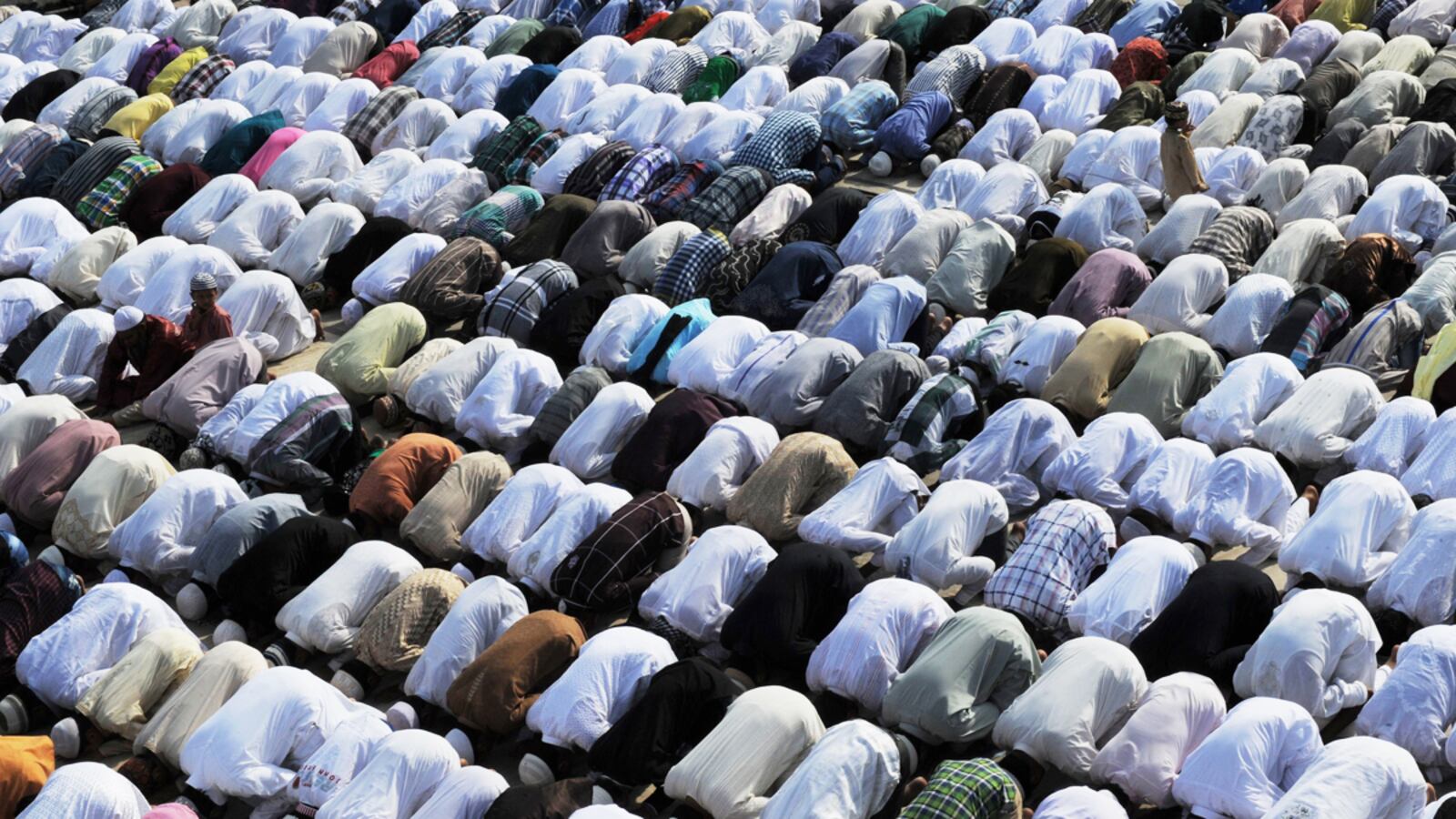1. Allah is not a name of a god. It is the Arabic word God, with a capital G, referring to the very same god that Christians and Jews worship. If you want to be very literal-minded it means “the god” because it is the definitive of the word “god” (ilah or ilāh), and if one adds the definitive article (al) it become Allah (Allāh, actually but let’s not quibble). In Farsi, God is called khodah—as in French, God is called Dieu, etc.
2. Mohammad isn’t a god.According to Islam, Mohammad is the final prophet, or messenger of God. He isn’t worshipped, since he isn’t God or an avatar of God. His example is emulated, but he is considered a real person, who eats, sleeps, loves, and so on. Islam has many prophets before Mohammad, including Abraham, Moses and Jesus and arguably Mary, because she spoke with God. Mohammad is just a man; progeny of human beings. In the Qur’ān it is clearly stated that God is neither begotten nor begets (lam yalid wa lam yūlad)
3. Speaking of Mary, mother of Jesus … she is considered to be among the finest of women and there is an entire surah, or chapter in the Qur’ān, entitled Maryam, the Arabic form of Mary. She is emulated because of her unwavering faith in God and her supreme spirituality. She becomes pregnant with Jesus, though a virgin, because God can do anything, but God is not considered to be the father.
4. Mohammad was not a womanizer. He married a widow, Khadijah, and was singularly devoted to her until she died. She left him with Fatima, their daughter. Upon her death, Mohammad did not want to remarry but was urged to do so by his followers. His subsequent marriages were primarily to form alliances with his nearest and dearest as well as with more remote followers. Aishah, daughter of Abu Bakr, was considered to be his favorite wife. In the Sunni tradition, she was married to him at a very early age and was consequently raised by him and was his only virgin bride. Her tender age was considered to be normal at the time, but marriages are not consummated until the bride has menstruated, just as in Game of Thrones. His other wives were either widows or divorcées. Mohammad wanted to form a tribe or ummah that was connected through faith, as opposed to blood ties. As this tribe grew, consolidating it through marriage ties was politically prudent. At the time, polygamy was the norm in Arab tribal society, and marrying widows and divorcées was a noble thing to do.
5. Women aren’t sold into marriage. Marriage and divorce in Islam have been greatly misunderstood. In Islam, marriage is a contract, not an oath. The groom has to give the bride a dowry to make the contract valid, and that dowry is for her and her alone to use as she wishes. Hence, her father or uncle or brother does not sell her. Unlike her Christian and Jewish sisters at the time, Muslim women could own property. As for divorce, it is not as simple as making a public declaration. Because marriage is a contract, dowry negotiations are taken very seriously; half the dowry is given at the marriage, while the second half has to be given if the bride asks for it or if the marriage is terminated through no fault of the bride. Furthermore, the groom needs to answer to the bride’s family of he wishes to terminate the contract. A bride can terminate the marriage if her husband is impotent or abusive; if he is an alcoholic or drug abuser; if he forces her to abandon her faith or act in a way that she deems as abandoning her faith; or if he disappears for over a year. Marriage as contract, not an oath, is are meant to be fluid, and if a couple is not happy in living together, they can part from each other, remarry and continue to live normal lives.

6. Mohammad was not illiterate. The word Qur’ān means recitation, coming from the root q-r-‘, which means primarily to recite or declaim and then to read. If Mohammad is said to be illiterate, that is to underscore the importance of the spoken word, not the written word. The angel Gabriel gave the command form of q-r-’, saying iqra’ , which means “recite!” in Arabic, when he transmitted the message of God as opposed to having something written on tablets. That is why memorizing the Qur’ān is so valued. Under Uthman, who was caliph from 644-656, the Qur’ān became a fixed text, as in it was written down as a finalized text and has not changed since. The style of the Qur’ān in Arabic is rhymed prose, so it is easier to memorize and is considered to be inimitable. The physical book as called a maṣḥaf (pronounced as maṣ-ḥaf), which means pages between two covers or a volume, but the value of those pages is in the recitation. When the Qur’ān became mass-produced, recitations of it were considered extremely reliable, to the great surprise of European editors.
7. You can’t be a Muslim if you don’t want to be. Contrary to the misnomer, “Islam or the Sword!”, the Qur’ān is quite clear about not forcing anyone to convert. Conversion must be done through the heart. It is simple because one just has to pronounce, with sincere intention, the shahida: lā ilāh ilā allāh wa muhammad rasūlu’llāh ( “there is no god but God and Mohammad is his messenger”) three times in front of credible witnesses. Hence one comes to Islam from pure intention as opposed to being schooled by a priest, minister or rabbi.
8. You are unlikely to meet 72 virgins in heaven. The Qur’ān says nothing about 72 virgins waiting for you in heaven. Heaven is described, among other things, as the opposite of the harsh desert, hence it is verdant with the river or body of water, Kawthar, and filled with hūr al ayn, which means “ones with eyes that are very dark around the pupil”—a sign of true beauty. The concept of 72 virgins comes from outside of the Qur’ān.
9. Non-Muslims are not infidels. Christians and Jews—also Zoroastrians, for that matter—are considered to be ahl al kitāb or “people of the book,” because they are monotheists, and Islam is strictly monotheistic. References to infidels in the Qur’ān usually have to do with the Quraishi of Mecca, Mohammad’s own tribe, because they tried to kill him and destroy his following. Same would go for any Christian or Jewish tribe with the same intent.






